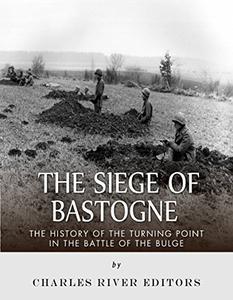 The Siege of Bastogne: The History of the Turning Point in the Battle of the Bulge by Charles River Editors
The Siege of Bastogne: The History of the Turning Point in the Battle of the Bulge by Charles River EditorsEnglish | August 27, 2015 | ISBN: 1517070147 | 75 pages | EPUB | 1.74 Mb
*Includes pictures *Includes accounts of the fighting written by generals and soldiers on both sides *Includes online resources and a bibliography for further reading *Includes a table of contents "They've got us surrounded - the poor bastards." - American army medic in Bastogne, December 20th, 1944 After the successful amphibious invasion on D-Day in June 1944, the Allies began racing east toward Germany and liberating France along the way. The Allies had landed along a 50 mile stretch of French coast, and despite suffering 8,000 casualties on D-Day, over 100,000 still began the march across the western portion of the continent. By the end of August 1944, the German Army in France was shattered, with 200,000 killed or wounded and a further 200,000 captured. However, Adolf Hitler reacted to the news of invasion with glee, figuring it would give the Germans a chance to destroy the Allied armies that had water to their backs. As he put it, "The news couldn't be better. We have them where we can destroy them." While that sounds delusional in retrospect, it was Hitler's belief that by splitting the Allied march across Europe in their drive toward Germany, he could cause the collapse of the enemy armies and cut off their supply lines. Part of Hitler's confidence came as a result of underestimating American resolve, but with the Soviets racing toward Berlin from the east, this final offensive would truly be the last gasp of the German war machine, and the month long campaign was fought over a large area of the Ardennes Forest, through France, Belgium and parts of Luxembourg. From an Allied point of view, the operations were commonly referred to as the Ardennes Offensive, while the German code phrase for the operation was Unternehmen Wacht am Rhein ("Operation Watch on the Rhine"), with the initial breakout going under the name of "Operation Mist." Today, Americans know it best as the Battle of the Bulge. Bastogne would become a legendary linchpin in the defense against the Ardennes Offensive, in part for its strategic importance but also because of the almost superhuman effort made to protect it. Seven important roads converged with the town of Bastogne, and the Germans, on their way to Antwerp, recognized its importance as a hub, but with the weather obscuring the military map and intelligence at an unusually low rate of abundance or reliability, no Americans on the ground, from private to general, knew precisely what was about to happen, or in what way it would manifest itself. Three officers, Colonel S.L.A. Marshall, Captain John G. Westover and Lieutenant A. Joseph Webber, collaborated to put it quite succinctly in the Washington Infantry Journal when they described Bastogne as "a series of small, dramatic military actions related more by circumstances beyond the control of the defensive forces involved than by the design of a single commander..." In an astonishing feat of planning, logistics and discipline, Patton's army redirected 133,000 vehicles, 62,000 tons of supplies, and the vehicles and men covered a combined distance of 1.5 million miles. To his superiors' amazement, Patton was poised to reach Bastogne and attack the Germans on December 22, and on December 21, he told Bradley, "Brad, this time the Kraut's stuck his head in the meat grinder, and I've got hold of the handle." Of course, for Patton's Third Army to relieve the siege, the men had to hold out a few days, which they were able to do because supplies were parachuted in and the Germans eschewed frontal assaults. In the end, Patton's army reached Bastogne in 4 days and lifted the siege, even he used superlatives to describe the action at Bastogne, calling it "the most brilliant operation we have thus far performed, and it is in my opinion the outstanding achievement of the war. This is my biggest battle."











